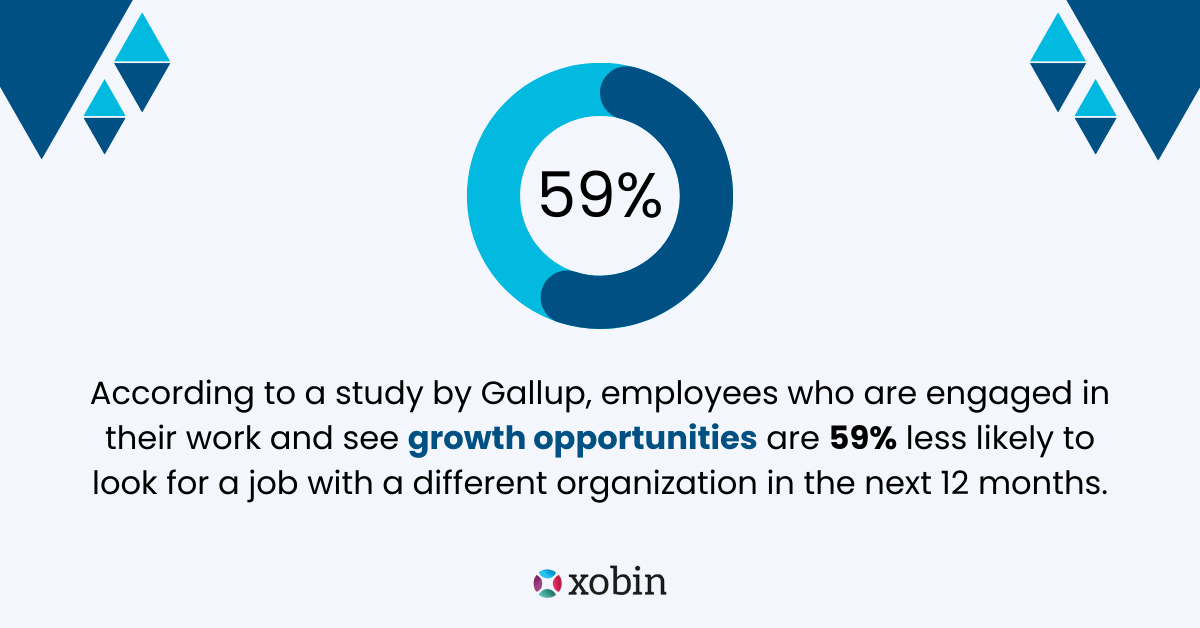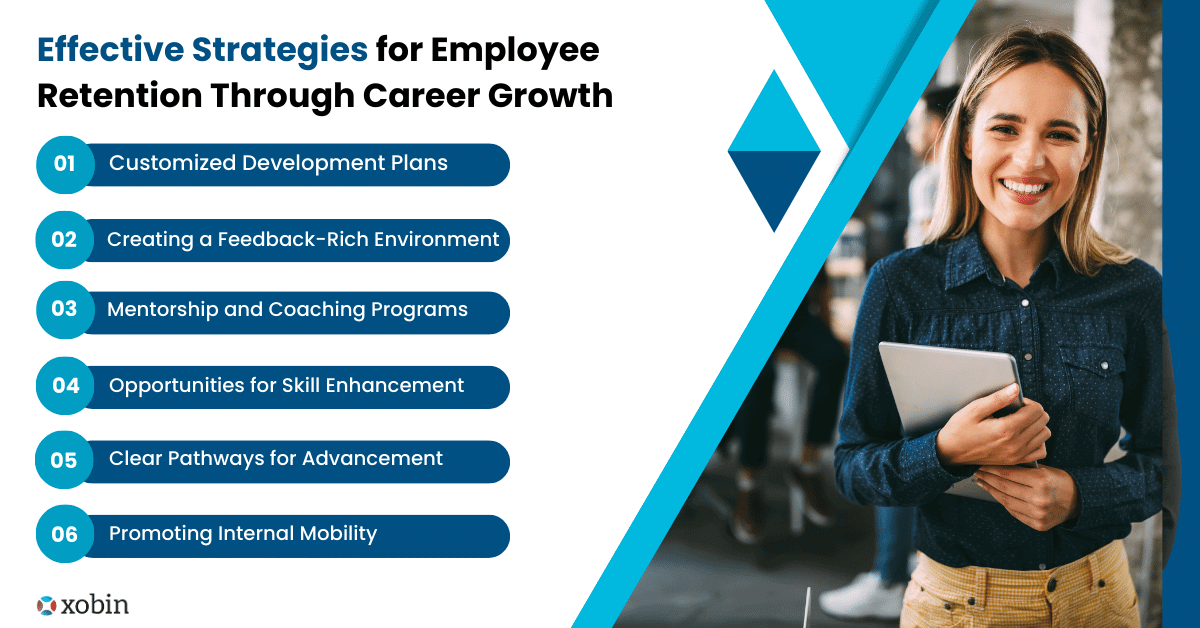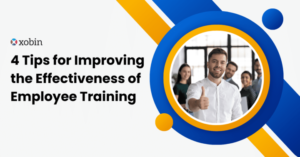In today’s dynamic job market, where talented professionals are in high demand, organizations face an ongoing challenge: retaining their top performers. Employee turnover can be detrimental, both financially and culturally, to a company. Hence, businesses are realizing the importance of investing in career growth as a strategic approach to retaining their valuable workforce.
Aligning employees’ motivation with the purpose of the organization results in a compelling outcome that sustains career growth. A study published in the Harvard Business Review revealed that employees who perceive alignment between their career goals and the company’s mission are 60% more likely to stay with the organization. This underscores the importance of creating a cohesive environment where the ambitions of employees in the workplace resonate with the overarching goals of the organization. This blog delves into the critical role of career growth in employee retention and explores effective strategies for fostering talent within an organization.
Table of Contents
What is Career Growth?
In a professional context, career growth encompasses moving forward and evolving. It includes advancing through different stages, acquiring new skills, and taking on more responsibilities. Moving from entry-level positions to managerial roles illustrates career growth. Furthermore, it requires continuous learning, networking, and seizing advancement opportunities.
Individuals empower themselves to climb the corporate ladder and realize their long-term career goals through career growth. Additionally, it promotes personal satisfaction and fulfilment by aligning with professional aspirations. Therefore, cultivating career growth demands dedication, perseverance, and a strategic approach to career development.
Understanding the Importance of Career Growth
Prioritizing career growth within the organization benefits not only individual employees but also plays a crucial role in the long-term success and competitiveness of the company. HR professionals can cultivate a motivated, skilled, and resilient workforce by investing in the people that propel the organization forward. Let’s take a look at how career growth is important!
Enhance Employee Engagement
Career growth opportunities stimulate an intent and commitment among employees, leading to higher engagement levels within the organization.
Attraction and Retention of Talent
Providing avenues for career growth attracts top talent and reduces turnover rates, as employees are more likely to stay with a company that invests in their professional development.
Increase Productivity
When employees perceive a clear path to advancement, it motivates them to enhance their performance in their current roles. Thereby increasing productivity and contributing to overall organizational success.
Development of Future Leaders
Career growth initiatives help identify and nurture potential leaders within the organization, ensuring a pipeline of skilled individuals ready to take on key roles in the future.
Positive Company Culture
Focusing on career growth nurtures a positive company culture that values and supports employees in their professional goals, encouraging unity and motivation among the workforce.
Competitive Advantage
Organizations with a focus on career growth gain a competitive edge in the market. They attract top talent and retain skilled employees, contributing to long-term success.
Alignment with Organizational Goals
Align career growth initiatives with organizational goals to ensure the development of employees aligns with the company’s long-term vision and strategy. This alignment maximizes the effectiveness of career development efforts and contributes to overall business success.
Positive Employer Branding
Companies that actively invest in the career growth of their employees earn a reputation as desirable employers. This leads to positive employer branding and attracting talent organically.
Types of Career Growth Opportunities that Organizations Can Leverage
Here’s a breakdown of various types of career growth opportunities that organizations can leverage to help employees broaden their skill set and knowledge:
Training Programs
Organizations can implement diverse training programs ranging from technical skills development to soft skills enhancement. These programs provide employees with structured learning experiences, facilitates continuous improvement.
Job Rotation
Through job rotation initiatives, employees get the chance to work in different departments or roles within the organization. This exposure enables them to gain a holistic understanding of the business and develop versatile skill sets.
Cross-Functional Projects
Promoting participation in cross-functional projects exposes employees to diverse perspectives and challenges, enhancing their adaptability and skill acquisition. Collaborating across departments leads to the development of new skills and cultivates adaptability.
Internal Workshops and Seminars
Hosting internal workshops and seminars on relevant topics allows employees to delve deeper into specific areas of interest. These events promote continuous learning and encourage the exchange of ideas within the organization.
Continuing Education Assistance
Offering financial assistance or flexible schedules for pursuing further education, such as certifications or advanced degrees, demonstrates a commitment to employee development. This support empowers individuals to expand their expertise and stay abreast of industry trends.
Stretch Assignments
Stretch assignments encourage innovation, resilience, and the development of problem-solving abilities. They are assigning challenging projects or tasks beyond the current roles of employees that provide opportunities for growth and skill refinement.
The Link Between Career Growth and Employee Retention
Research consistently shows that career growth plays a pivotal role in employee retention. When employees perceive a clear path for advancement and feel supported in their professional development, they are more likely to stay with their current employer. According to a study by Gallup, employees who are engaged in their work and see opportunities for growth are 59% less likely to look for a job with a different organization in the next 12 months.

Empowering Employees Through Career Development Initiatives
Organizations prioritizing career growth show dedication to their employee’s long-term success. They empower individuals by providing skill enhancement avenues, training programs, and mentorship opportunities, allowing them to shape their career paths within the company. This proactive approach boosts morale, loyalty, and develops a Feeling of belonging among employees.
Aligning Individual Goals with Organizational Objectives
Effective career growth and development align individual ambitions with organizational goals. Through transparent communication and goal-setting frameworks, employees gain clarity on how their contributions contribute to the broader mission. This alignment inspires an understanding of purpose and ownership, reducing the likelihood of turnover as individuals see themselves as integral to the organization’s success.
Cultivating a Culture of Learning and Growth
A culture that values continuous learning and growth is a magnet for top talent. Organizations that invest in employee development signal that they are invested in their people’s future. Whether through tuition assistance programs, cross-functional training, or leadership workshops, these initiatives not only enhance skill sets but also enhance a culture of innovation and adaptability.
How Career Growth Improves Employee Retention?
Career growth significantly enhances employee retention rates. According to a study by LinkedIn, 94% of employees would stay at a company longer if it invested in their career development. Moreover, providing opportunities for advancement creates loyalty among employees. Furthermore, when employees see a clear path for growth within the organization, they are more likely to remain committed. In addition to this, companies that prioritize career development experience lower turnover rates.
Consequently, investing in training and development programs can lead to substantial cost savings in recruitment and onboarding. Therefore, uplifting a culture of continuous learning and advancement is crucial for retaining top talent. As a result, organizations can benefit from higher employee engagement and productivity levels. Thus, career growth initiatives not only retain valuable employees but also contribute to the overall success of the company.
Effective Strategies for Employee Retention Through Career Growth

Customized Development Plans
Recognizing the uniqueness of each employee, organizations should prioritize crafting personalized development plans. HR professionals can tailor growth opportunities by understanding individual strengths, interests, and career goals, aligning them with the desires of employees. This approach enhances job satisfaction and showcases a commitment to their professional advancement.
Creating a Feedback-Rich Environment
For optimal employee growth and development, organizations must regularly offer constructive feedback and recognition, stimulating a culture of continuous improvement. This practice not only makes employees feel valued and supported but also boosts their engagement and commitment to the company. Additionally, timely feedback allows for course correction, reducing the risk of dissatisfaction that could result in turnover.
Mentorship and Coaching Programs
Mentorship and coaching programs offer invaluable support for employees navigating their career paths. Pairing experienced mentors with mentees allows for knowledge transfer, skill development, and guidance in overcoming challenges. Such programs develop a culture of learning and growth within the organization, promoting stronger bonds between employees and the company.
Opportunities for Skill Enhancement
In today’s fast-paced work environment, continuous learning is essential for staying relevant and competitive. Organizations can facilitate skill enhancement through various means, such as workshops, online courses, and cross-functional projects. Providing employees with opportunities to acquire new skills not only enriches their professional expertise but also enhances their sense of value and belonging within the organization.
Clear Pathways for Advancement
Ambiguity about career progression can lead to dissatisfaction and disengagement among employees. Therefore, organizations must establish clear pathways for advancement, outlining the criteria and opportunities for promotion or lateral movement. Transparent communication regarding potential career trajectories instills confidence in employees and reinforces their commitment to long-term growth with the company.
Promoting Internal Mobility
Encouraging internal mobility empowers employees to engage with varied roles and responsibilities across the organization. This enriches their skill sets while preserving institutional knowledge through lateral moves, promotions, and job rotations. Additionally, internal hires adapt faster, reducing ramp-up time and boosting productivity overall.
Measuring the Impact: Reducing Employee Turnover Through Career Growth
Reducing Attrition Costs
Investing in career growth initiatives helps mitigate turnover rates, thus reducing hidden costs like lost productivity, decreased morale, and disruptions to client relationships. This proactive approach preserves financial resources by addressing the root causes of employee turnover beyond recruitment and onboarding expenses.
Tracking Retention Metrics
To measure the effectiveness of talent retention efforts, organizations need to monitor key metrics linked to employee turnover. These metrics encompass turnover rates, retention rates, exit interview feedback, and employee satisfaction scores. Analyzing these indicators routinely enables HR professionals to detect trends, highlight areas for enhancement, and adjust employee retention strategies accordingly.
Continuous Feedback and Iterating
Continuous feedback and iteration drive the ongoing process of employee retention. HR professionals actively seek input from employees regarding their career goals, development needs, and overall satisfaction with the organization. Open communication channels fostered by companies enable proactive addressing of concerns and adaptation of retention strategies to evolving needs and expectations.
Building a Reputation as the Employer of Choice
Top talent gravitates toward organizations committed to facilitating employee development and growth, establishing them as magnets for talent. A strong employer brand not only draws in high-caliber candidates but also acts as a defense against turnover. Prioritizing employee well-being and future investment cherish loyalty among employees, encouraging them to stay with the company. For example, dehydration can significantly impact productivity, health, and overall well-being.
Empower Employee Career Growth and Development with Talent Assessments
Talent assessments serve as powerful tools for facilitating employee career growth, empowering individuals to maximize their potential, and contributing effectively to organizational success. Here’s a list of talent assessments that you can use to promote employee career growth:
Personality Assessments
These evaluations delve into an individual’s traits, strengths, and weaknesses, providing insights into their compatibility with different roles and work environments. They assist in aligning employees with positions that match their personalities, cherishing job satisfaction and career growth.
Skills Tests
By assessing specific skill sets relevant to various job roles, the skills tests help identify areas of proficiency and areas that require improvement. Employees can utilize the results to focus on developing skills crucial for advancement within their current roles or transitioning to new positions.
360-Degree Feedback
This assessment involves gathering feedback from an employee’s peers, supervisors, and subordinates. It offers a comprehensive view of an individual’s performance, highlighting areas for development and providing valuable insights for career growth.
Career Aptitude Tests
These assessments evaluate an individual’s natural abilities, interests, and career preferences. By understanding their aptitudes, employees can make informed decisions about career paths that align with their strengths and aspirations, facilitating long-term growth and satisfaction.
Leadership Assessments
These evaluations focus on identifying and developing leadership qualities in employees. By pinpointing areas of strength and areas for improvement in leadership skills, individuals can take targeted steps to enhance their effectiveness as leaders and advance in their careers.
Emotional Intelligence (EI) Assessments
EI assessments measure an individual’s ability to understand and manage emotions, as well as to navigate social interactions effectively. Employees can leverage insights from these assessments to enhance their interpersonal skills, build strong relationships, and progress in their careers.
Cognitive Ability Tests
Cognitive ability tests gauge an individual’s cognitive capabilities, such as problem-solving skills, critical thinking abilities, and decision-making aptitude. Employees can use the results to identify areas where they can enhance their cognitive abilities, positioning themselves for career advancement opportunities that require higher-level thinking skills.
Conclusion
Organizations aiming to retain top talent must acknowledge the critical importance of advancing career growth. Offering employees chances for learning, growth, and advancement strengthens retention rates while nurturing an engaged and high-performing culture. Therefore, Investing in the professional development of employees remains essential for effective talent retention strategies.






